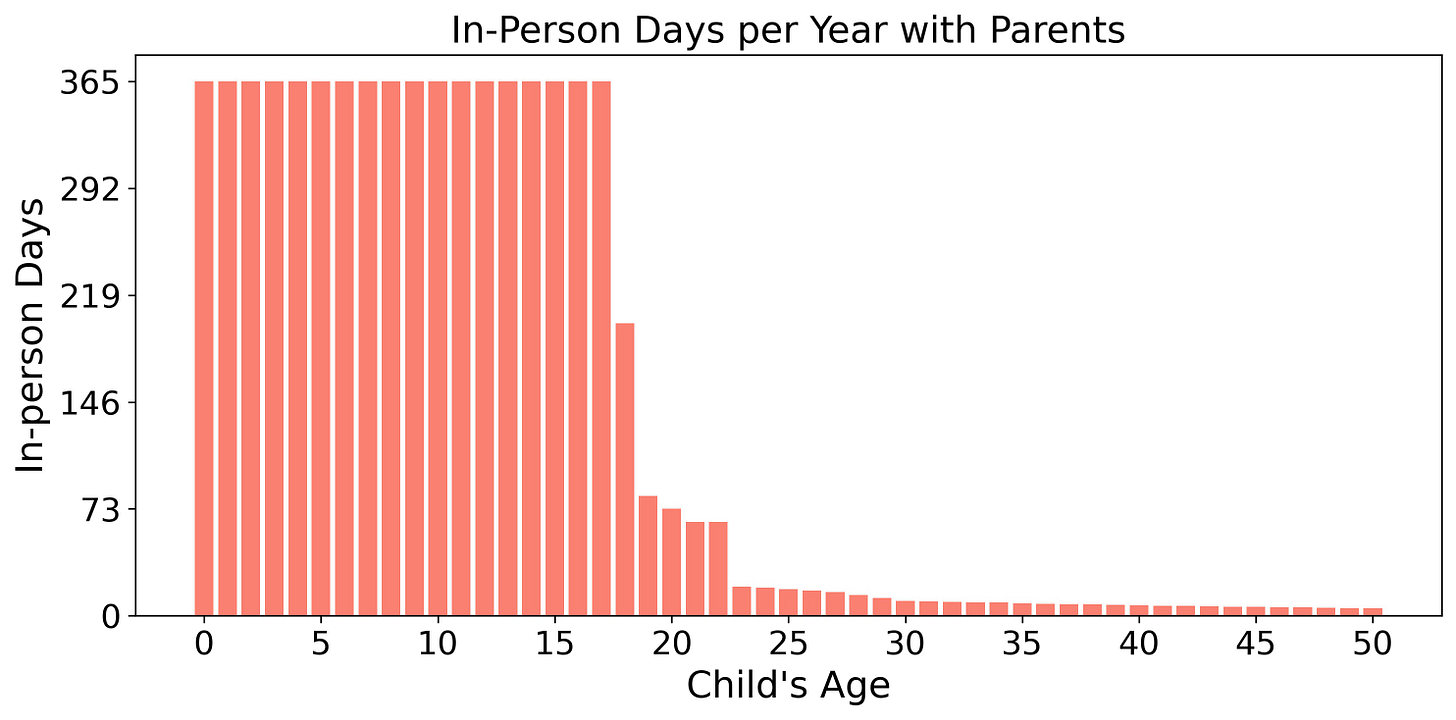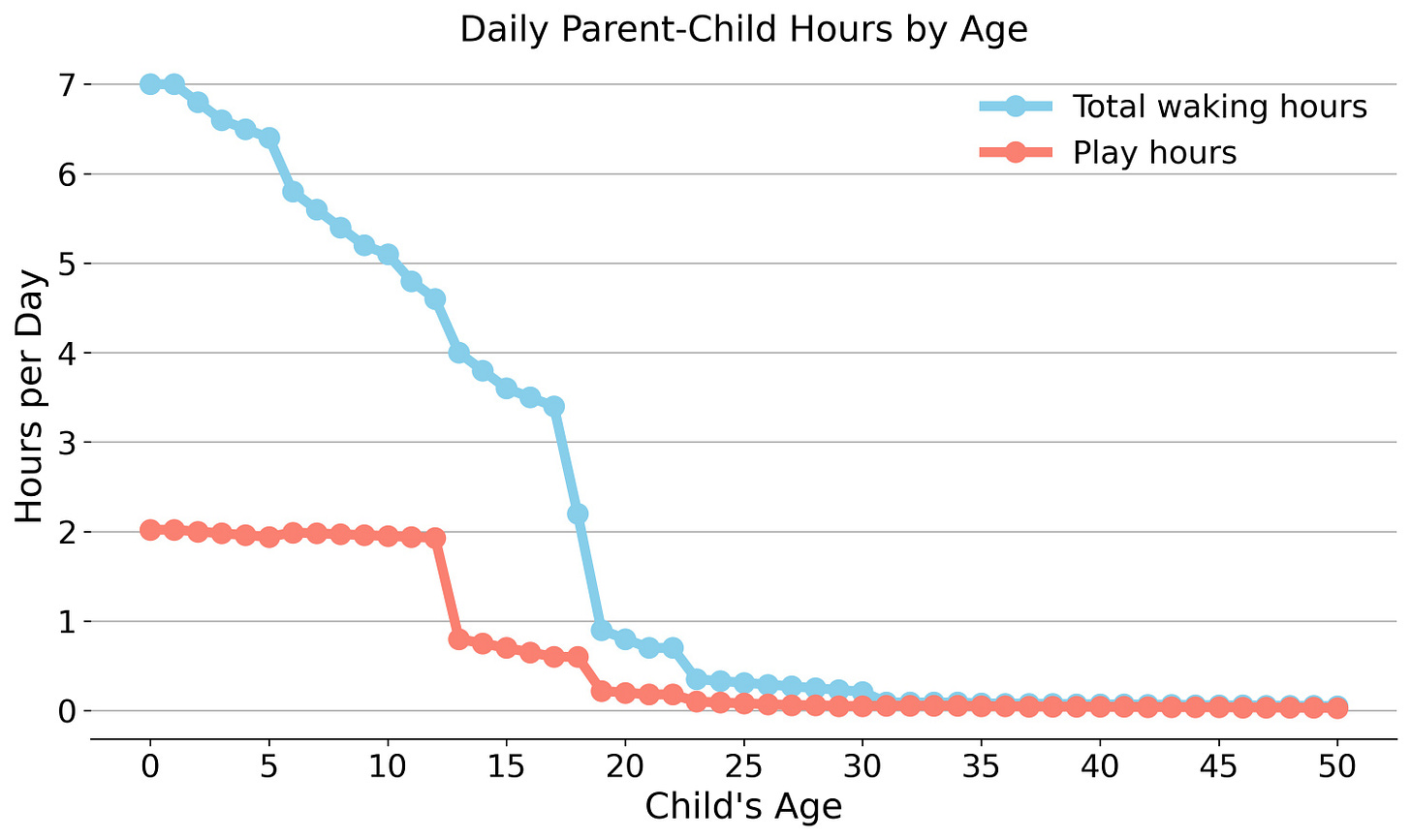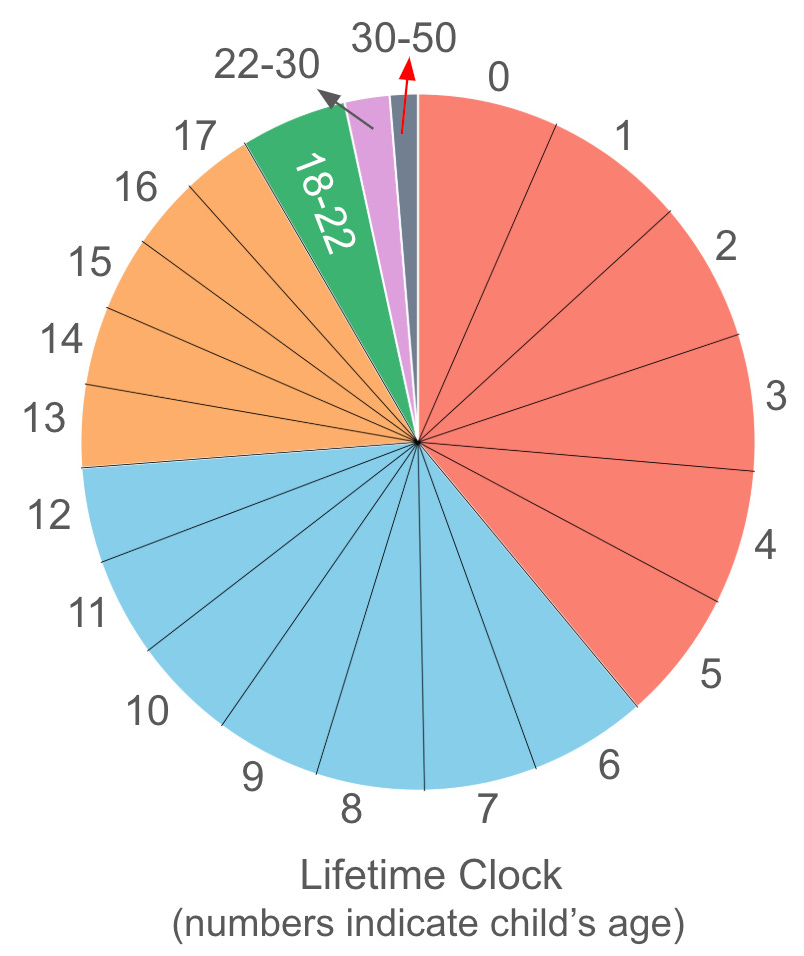“The days are long, but the years are short.” This is especially true in parenting.
Picture this: you’re holding your newborn, marveling at tiny fingers wrapped around your thumb, listening to every hiccup, studying every movement. Your heart is full. You can't imagine life any other way. You think, we have all the time in the world.
Then, you blink, and suddenly she’s walking, running, talking, teaching you what she learned at school. You blink again, and she’s packing for college. You wonder when the bedtime stories stopped, when the trips to the park turned into screen time, when the questions stopped being about dinosaurs and started being silent.
The truth is, time with your child doesn’t just fly. It disappears. Quietly. Gradually. Until it’s mostly gone.
So how much time do you really have to enjoy all the wonderful and less-wonderful moments with her? When you measure it out, when the math is actually calculated, the truth hits harder than you’d expect.
4.3 years of waking, face-to-face time.
1.3 years of play.
That’s not how much time you spend in her early childhood. That’s the entire lifetime total—before she turns 50. That is all the time you may ever have together.
All the errands, all the dishes, all the diaper blowouts, mood swings, homework help, science fair projects and snowball fights… squeezed into just four short years of awake time together.
From the moment that baby opens her eyes, you’re spending more time with her than you ever will again.
By the time she is eight, over half of your entire life’s supply of shared time is already behind you.
By high school graduation, you’ll have used up 95% of it.
Let that sink in for a moment.
Once you’ve blinked that fact into focus, parenting feels different.
The cliff of lifetime mountain
“Where did all the time go?”
“But I’m always with my kid. This can’t be right!”
Yes, when your child is little, you're the center of her universe. You're orchestrating birthday parties, bedtime routines, and family breakfasts. Nearly every day, she’s with you.
But then comes 18. College, internships, travel, jobs, romantic relationships. They all sweep her into the wide world, as they should. And you? You go from 365 shared days a year to fewer than 90 days.
It’s not gradual. It’s not gentle. It’s a cliff you didn’t know was coming until you’ve already fallen off it.
And after college? The number drops again. New cities. Demanding careers. Holidays split between in-laws. Maybe grandchildren. If you’re lucky, you see your child 10 times a year, for a few hours at a time.
From age 30 to 50, those visits become precious and sparse. Based on national survey data, we estimate that they add up to only 156 more days together. Total. Over two entire decades.
Yes, you never stop being a parent. But you do stop being the center of their universe, the daily presence, the default companion. Your influence continues. But your shared moments—the kind that builds stories, inside jokes, lasting connection—is hugely front-loaded.
The time we really have together
A year has 365 days. But that doesn’t mean 365 days of togetherness. The actual parent-child waking time is much less than that.
According to the American Time Use Survey (ATUS, 2021 release), during those early years, parents spend on average 7 waking hours per day with their child. But the number falls quickly. By kindergarten, it’s already less than 6 hours. By middle school, our time is diluted with after-school activities and friends. By high school, time reduces to less than 4 hours per day. You’re lucky to get a meaningful conversation between practices and part-time jobs. After graduation? The calendar is filled with internships, college, work trips, and romantic partners. You’re no longer the default. The hours trickle into holidays, pop-ins, and quick brunches.
Add it all up—day by day, year by year—and the result becomes almost unthinkable:
4.3 years.
That’s just 51 months. That’s the entire lifetime of waking hours with your child before they turn 50.
Imagine a grid of 600 dots which represent 600 months in 50 years. Each column represents a year with 12 dots. Of all the 600 dots, just 51 are colored. That’s the months you’re truly, consistently together with your kid. The rest, all those empty dots, is your life without her presence.
Or let’s picture a clock. The full circle is all the hours you’ll ever spend face-to-face.
When your child is 0–5, the clock ticks slowly, filled with bedtime stories, spilled cereal, and silly dances. But just before you realize it, the clock starts ticking faster and faster.
By the time she turns 8, half of your face-to-face time is already behind you.
By high school graduation, you’ve used up 95% of it.
That leaves just 5% for the rest of your life.
An even harder fact is that the parent-child waking hours does not mean a true active and meaningful interaction.
How many of those hours are spent doing chores, scrolling on phones, or in the same room but not really together? How many hours are spent actually playing? Not supervising. Not reminding, nagging, preparing, or cleaning. Just playing. It’s the giggles during a pillow fort. The pirate adventure on a rainy afternoon. The backyard splash fights, the silly voices in bedtime books. It’s the eye-level, full-presence, I-see-you moments.
It’s rare and precious.
From birth to age 12, you might have an average of 2 hours of play a day.
By middle school, it’s down to 1.
By college, it’s barely measurable.
In total? 1.3 years. Just 15 months. That’s 15 dots in your lifetime plot.
That’s all the time that you could ever have playing with your kid, in your whole life.
What does it mean to us parents?
This isn’t about quitting your job or spending every hour with your kids. You have bills. Responsibilities. A need for rest.
On the other hand, this is also not about chasing an impossible quota of “quality time”. You don’t need to cram magic into every bedtime, every snack, every car ride. So if you’ve ever whispered to yourself, “Did I miss too much today?” Take a breath. Life is messy. Kids are resilient.
It’s about understanding just how limited and how precious your time with them really is. It’s about being awake to the time you do have, so you can shape it with intention. Because when you realize the clock is ticking faster than you think, you stop wasting time watching it. You start using it.
You start to notice the magic in small things: the hand slipped into yours as you walk, the whispered question in the dark, the request for “just one more” story.
And in those small moments, you realize it was never about doing everything. It was about showing up. Being present and really living at the moment. When you are, those small moments become the memorable ones that last. For them. And for you.
How to make it count
Let’s be real: parenting is beautiful, but it can also be exhausting. We’re not aiming for perfection. We’re aiming for presence.
Start small. Start right away.
Say “yes” more than “not now”, even when you’re exhausted. Kids rarely ask twice. Your future self won’t remember the spreadsheet you finished today. But you will remember the 9 p.m. pillow fort.
Schedule play first, chores second. Put it on your calendar. Set an alarm if you must. Ten minutes of being all-in is worth more than an hour of being half-there.
Multiply micro-moments with play. Join the pretend game, even if you feel ridiculous. Narrate traffic lights. Race to put on shoes. Turn bath time into pirate adventure time. Bedtime story? Add a ridiculous accent. Every silly crumb snowballs.
Start early. Remember? Most of your shared time happens when they’re young. Front-load adventures. It’s never too early to explore together: visit museums, go to the zoo, watch a soccer match. Even if they nap through it or forget details later, they’ll remember being with you. So will you.
Put the phone down. Please. Not every moment needs your full attention. But some moments will only happen once.
One day, roles flip. You’ll be the parent waiting for a visit, hoping your adult child carves out a long weekend. The empathy you build now shapes tomorrow’s relationship. Model attentive presence today, and one day, they may return the gift.
Ending: the real treasure of parenting
Yes, parenting is hard, arguably the hardest role you’ll ever take on. But it's also fleeting. Time doesn’t wait.
You have 4.3 years of awake time with your child. You have 1.3 years of pure play.
That’s not a reason to panic. It’s a reason to slow down. To breathe. To see what’s right in front of you.
It’s a reminder to say yes more often. To hold the hug a second longer. To listen to the off-topic bedtime ramble. To laugh when they ask you to make the dinosaur voice again.
Because those are the moments that matter, not just for them, but for you.
You’re not just managing routines. You’re building a relationship that spans decades. And the foundation of that relationship is made of small, ordinary, playful moments.
Every lasting memory starts with one ordinary moment. Live at the moment. Make yours count.
The next time your five-year-old begs for “just one more” bedtime story, remember: you’re not choosing between now and later. You’re choosing between now and never again.
Share the graph. Start the conversation.
Thank you for reading through this post. I hope it offered a new perspective on parenting and on how precious the time we have with our kids truly is.
If this article resonated with you, please share it. Tag the friend who’s always stuck at the office. Text it to your sibling who just became a parent.
I’d love to hear from you. Leave a comment below. Let’s connect as parents, learn from each other, and grow together.
Print the mountain. Pin it to the fridge.
Because once you see time mapped out, “maybe later” turns into “right now.”
And that’s where memories are made.
Supplementary: data and methods
I use child age 0-50 as a measure of the whole life we may have with her: if a child was born when we were 20 (or 30 or 40), we would be 70 (or 80 or 90) when they’re 50.
Detailed methods, assumptions and data used are presented in the following supplementary post: data and methods.
References of data:
U.S. Bureau of Labor Statistics. American Time Use Survey Microdata, 2021.
National Association of Colleges & Employers 2022 Internship Survey.
Harvard, Michigan, Texas academic calendars.
U.S. DOT Thanksgiving Travel Trends 2019.
CDC NHIS 2021.
AARP & NORC Caregiving Study 2019.
Tim Urban, “The Tail End,” 2015.










Awwww so bittersweet, and such validation for making the decision to prioritize parenthood in these early years. Thanks Kunlun
Thank you for putting this into perspective. It's also why I’ve chosen to work just three days a week — so I can spend more of his waking hours by his side. The days (and nights) can be exhausting, but I wouldn’t trade watching him grow up for anything.